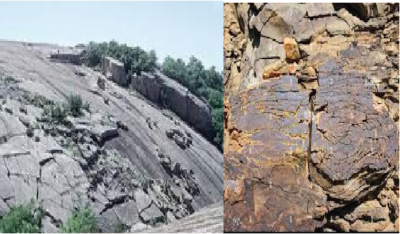
Differentiate between block disintegration and exfoliation

Block disintegration is Physical weathering process by which well jointed and well bedded rocks are broken down into smaller blocks through the process of expansion and contraction of rocks in situ. It is due to temperature changes and frost action.
In East Africa; block disintegration common in Semi-arid and arid areas such as Karamoja sub-region, Sukuma land, Turkana land etc and on the glaciated mountains such as Kirimanjaro, Kenya and Ruwenzori ranges. Block disintegration results into rengular shaped blocks
Exfoliation is a physical weathering which involves the peeling off of surface layers of exposed rock as result of alternating heating during day causing expansion and cooling at night causing contraction in Situ

Exfoliation is common in exposed homogeneous rocks in Semi- arid and arid areas such as Karamoja,
Turkana land, etc.
Exfoliation results into exfoliation domes e.g. the Bismarck rock at Mwanza.
Block disintegration is Physical weathering process by which well jointed and well bedded rocks are broken down into smaller blocks through the process of expansion and contraction of rocks in situ. It is due to temperature changes and frost action.
In East Africa; block disintegration common in Semi-arid and arid areas such as Karamoja sub-region, Sukuma land, Turkana land etc and on the glaciated mountains such as Kirimanjaro, Kenya and Ruwenzori ranges. Block disintegration results into rengular shaped blocks
Whereas
Exfoliation is a physical weathering which involves the peeling off of surface layers of exposed rock as result of alternating heating during day causing expansion and cooling at night causing contraction in Situ

Exfoliation is common in exposed homogeneous rocks in Semi- arid and arid areas such as Karamoja,
Turkana land, etc.
Exfoliation results into exfoliation domes e.g. the Bismarck rock at Mwanza.

Thanks for being such a guide. Stationary
This is exactly what I was looking for. 500 ka redeem code
The MBBS Admission Through Management/Nri Quota in Karnataka ensures premium education opportunities.
Secure your medical career with MBBS Direct Admission in Uttar Pradesh.
Use the Raja Luck Invite Code to get exclusive rewards and bonuses.
Your in-depth insights on Buy Backlinks are truly practical for ranking websites quicker.
The Backlink Strategy shared here makes a lot sense. Terrific content!
Unlock digital subscriptions and premium apps with the newest 100 Google Play redeem code.
Stay ahead in the tech market with innovative Server Rental in Noida backed by outstanding support.